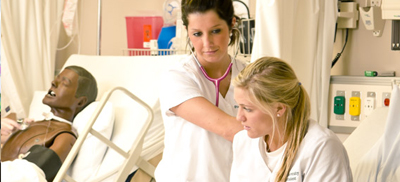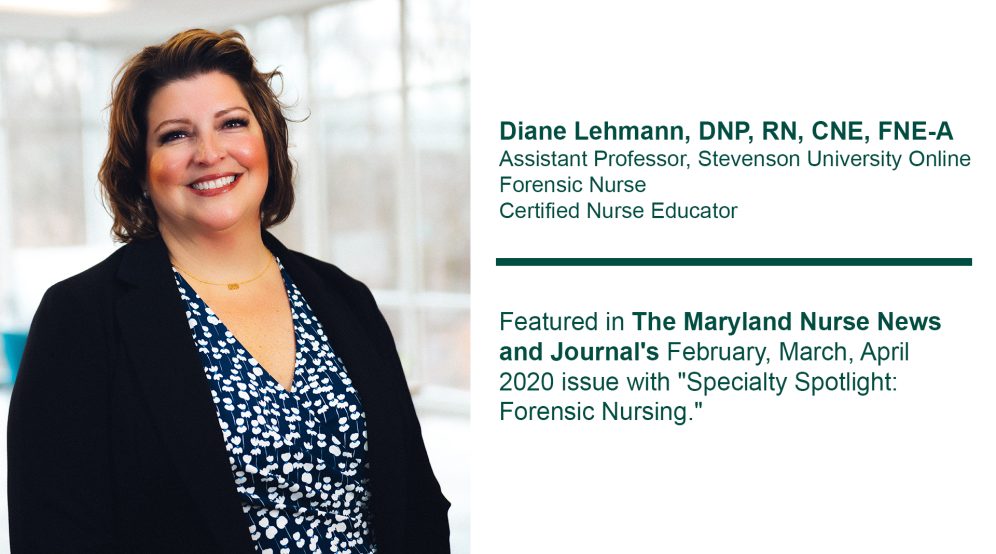Diane Lehmann, DNP, RN, CNE, FNE-A, Assistant Professor at Stevenson University Online was featured in The Maryland Nurse News and Journal’s February, March, April 2020 issue with “Specialty Spotlight: Forensic Nursing.”
Diane Lehmann, DNP, RN, CNE, FNE-A, an Assistant Professor with Stevenson University Online and Certified Nurse Educator, has a unique role as a Forensic Nurse in Baltimore City. Read her interview in The Maryland Nurse News and Journal below.
Source: Lehmann, Diane. “Specialty Spotlight: Forensic Nursing.” The Maryland Nurse News and Journal. February, March, April 2020, p. 18 – 19.
Forensic Nurses are specially trained and educated individuals who care for victims of violent crimes. The Bureau of Labor Statistics does not isolate nursing demands specific to forensic nursing. However, the Bureau does anticipate a 16 percent increase in the nursing job market between now and 2024, based upon baby boomers both retiring, and becoming diagnosed with illness. Maryland is among the sixteen states with the greatest anticipated nurse needs. Between the rise and fall of local and national violent and non-violent crime, and the current vacancy of nurses in practice, there is sure to be a need for forensic nurses (BLS, 2019). The demand for forensic nurses, those nurses trained to apply criminal and social sciences to victims of trauma, rape, domestic violence, interpersonal violence, elder and child abuse (International Association of Forensic Nurses, 2019; Fitchburg State University, 2019) and disaster relief, is based upon violent crime incidence (Governor’s Office of Crime Control & Prevention, 2018), desire for professional opportunity, and income. This article provides the reader insightful information briefly highlighting the roles, responsibilities, and career options for the forensic nurse, answering common questions about this career focus.
Q: What exactly is a forensic nurse?
A: Using the nursing process and a multi system approach to administer forensic healthcare, collect evidence, and connect the victim to community resources, the forensic nurse improves health and wellness for those persons.
The most recognized type of forensic nurse is the Registered Nurse who has completed 40 hours of didactic training and 40 hours of clinical training geared towards caring for, and treating, patients suffering a sexual assault (Maryland Board of Nursing, 2018). While the training forensic nurse participates in conducting evidentiary examinations for victims of sexual assault with the licensed FNE-A (Forensic Nurse Examiner-Adult), additional education beyond the classroom didactic sessions include meeting with victim advocacy groups, sexual assault recovery teams, law enforcement, the crime lab, and the State’s Attorney’s Office (MBON, 2018). Forensic Nurse Examiners are qualified to provide medical care and conduct evidentiary examinations on victims and perpetrators of crimes involving sexual, physical, or domestic abuse (MBON, 2018). Within hospital-based programs, such presenting victims would be recognized as enduring acute or chronic domestic or sexual abuse, rape, interpersonal violence, human or sexual trafficking, elder abuse, and or strangulation. The FNE is either licensed to care for adults (those 13 ages or older) or children, or both. The distinction of either A or P after the credential FNE, displays this licensure.
Q: What is the career outlook for forensic nurses?
A: As the rates of disaster occurrences, violent crimes, perpetrator incarcerations, and community awareness of reporting criminal offenses increase, so does the need for professionally educated nurses to care for this population caught between nursing and the law.
In Maryland, there were 167,093 total crime incidents reported in 2017 compared to 168,538 in 2016. The crime index total decreased one percent in 2017 when compared to 2016. Violent crime increased six percent. The violent crime group consists of murder, rape, robbery, and aggravated assault. (Central Records Division, 2017 Uniform Crime Reporting, 2019, p. 5).
Q: What is the monetary compensation for forensic nurses?
A: Forensic nursing job salaries’ in Maryland range from $42,000- 74,000 with an average earning point of $55,930.00 (Glassdoor, 2019). A job search using Indeed and Glassdoor hiring websites for Forensic Nurse Examiners (FNE) and SAFE Nurses (Sexual Assault Nurse Examiners) elicited 11 posted positions in Maryland. Institutions seeking forensic nurses do not always advertise on such job search sites, so this is not an inclusive finding for open forensic nursing positions. Four job postings were listed on the International Association of Forensic Nurses Career Center site (IAFN, 2019) as of November, 2019. Often, FNE positions are filled on a per diem or on-call basis.
Q: Do forensic nurses only care for sexual assault victims?
A: Forensic Nurses interface with victims of violent criminal activity. However, this role is not inclusive of the other positions Forensic Nurses can fill. The roles and positions Forensic Nurses may Improving Vaccination Compliance continued from page 15 be prepared to fulfill, through higher education, training, and or certification include Forensic Nurse Examiner, Death Investigator, Legal Nurse Consultant, Correctional Nurse, Public Health Nurse, Forensic Mental Health Nurse, and those involved in mass disaster management and emergency or trauma services (IAFN, 2019; FSU, 2019).
Q: What does a forensic nurse do for victims of intimate crime?
A: According to The International Association of Forensic Nurses, core competencies include that advance practice forensic nurses
1. …develop, promote, and implement protocols and systems responding to victims and perpetrators of trauma, injury, accidents, neglect, abuse, exploitation, and all forms of violence.
2. …impact research and policy affecting human responses to violence, injury, trauma, accidents, neglect, abuse, exploitation, and all forms of victimization.
3. …develop and supervise systems of care for complex health problems related to accidents, trauma, crime, victimization, abuse, neglect, exploitation and all forms of violence.
4. …educate others in the concepts and practice of forensic nursing and forensic health. (2004, pp. 1-5)
In carrying out these competencies, the Forensic Nurse conducts an evidentiary examination collecting evidence from the patient via verbal interview, photography, and DNA swabbing. Additionally, the FNE-A provides HIV and STI prophylactic treatment.
In conclusion, this article has sought to answer the most frequently asked questions about forensic nursing. The author’s hope is that readers will now be educated to encourage patients’ experiencing criminal victimization to seek professional nursing care, collaborating with or without the law enforcement team.
Dr. Lehmann is an Assistant Professor at Stevenson University Online and is a Certified Nurse Educator. She practices as an FNE-A in Baltimore City. Dr. Lehmann’s research interests include program assessment, Complementary Alternative Medicine, and human victimization.
References
Central Records Division, 2017 Uniform Crime Reporting. (2019). Uniform crime reporting program. Retrieved from https://mdsp.maryland.gov/Document%20 Downloads/2017%20Uniform%20Crime%20Report.pdf
Fitchburg State University. (2019). MS in forensic nursing online. Retrieved from https://www.fitchburgstate.edu/academics/ graduate-studies/graduate-programs/ms-forensic-nursing/
International Association of Forensic Nurses. (2004). Core competencies for advanced practice forensic. Retrieved from https://cdn.ymaws.com/www.forensicnurses.org/resource/ resmgr/Education/APN_Core_Curriculum_Document.pdf
International Association of Forensic Nurses. (2019). Forensic nursing education guidelines. Retrieved from https://www. forensicnurses.org/page/EducationGuidelines Maryland Board of Nursing (2018).
Clinical requirements for the RN-FNE-A: Adult training program. Retrieved from https:// mbon.maryland.gov/Documents/fnetp_adult.pdf
Maryland Board of Nursing (2018). Scope and standards of practice. Retrieved from http://www.dsd.state.md.us/comar/ comarhtml/10/10.27.21.04.htm
United States Bureau of Labor Statistics. (2019). Occupational outlook handbook: Registered nurses. Retrieved from https:// www.bls.gov/ooh/healthcare/registered-nurses.htm






